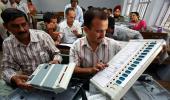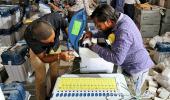Supreme Court judge Dipankar Datta on Friday said there seems to be a concerted effort to discredit, diminish and weaken India's progress on every possible frontier and any such attempt has to be "nipped in the bud".

Justice Datta, who was part of the apex court bench, which rejected pleas seeking complete cross-verification of votes cast using EVMs with a voter verifiable paper audit trail, said in recent years, a trend has been fast developing of certain vested interest groups endeavouring to undermine the achievements and accomplishments of the nation.
Writing his views in a separate verdict while concurring with the opinion of Justice Sanjiv Khanna, who was heading the bench, Justice Datta said the question of reverting to "paper ballot system", on facts and in the circumstances, does not and cannot arise.
"It is of immediate relevance to note that in recent years, a trend has been fast developing of certain vested interest groups endeavouring to undermine the achievements and accomplishments of the nation, earned through the hard work and dedication of its sincere workforce," he said.
"There seems to be a concerted effort to discredit, diminish, and weaken the progress of this great nation on every possible frontier. Any such effort, or rather attempt, has to be nipped in the bud," Justice Datta said.
He said no constitutional court would allow such attempt to succeed as long as the court has a say in the matter.
The bench was dealing with petitions, including the one filed by the NGO Association for Democratic Reforms, which also sought a direction to return to the paper ballot system in elections.
"I have no hesitation to accept the submission of senior counsel for the ECI (Election Commission of India) that reverting to the 'paper ballot system' of the bygone era, as suggested, reveals the real intention of the petitioning association to discredit the system of voting through the EVMs and thereby derail the electoral process that is underway, by creating unnecessary doubts in the minds of the electorate," Justice Datta said.
He observed it is only improvements in the electronic voting machines or even a better system that people would look forward to in the ensuing years.
"I have serious doubt as regards the bona fides of the petitioning association when it seeks a reversion to the old order. Irrespective of the fact that in the past efforts of the petitioning association in bringing about electoral reforms have borne fruit, the suggestion put forth appeared inexplicable," he said.
Justice Datta said one cannot be oblivious that in a society pledged to uphold the rule of law, none -- howsoever high or low -- is above the law.
"Concepts of unfettered discretion or unaccountable action has no place in the matter of governance; hence, neither can the ECI nor can any other authority claim to possess arbitrary power over the interests of an individual voter and seek cover from the sunlight of judicial scrutiny if, indeed, a valid cause is set up for interference," he said.
He said the sanctity of the electoral process has to be secured at any cost and it has never been in doubt.
Observing that conducting elections in India is a "humongous task", Justice Datta said it presents a novel challenge, not seen elsewhere in the world.
He said there are 97 crore eligible voters for the 2024 general elections in the country, which is more than 10 percent of the world population.
"The Representation of the People Act, 1951 which, to my mind, amidst the vast legislative landscape of the nation is the most important enactment after the Constitution of India, is also the most effective instrument to uphold democratic and republican ideals, which are the hallmarks of our preambular promise," he said.
He said the larger the electorate, the greater the challenges associated with the elections and the EC has an onerous responsibility to shoulder and there is absolutely no margin for error.
Justice Datta said periodical challenges to electoral processes, which gain momentum particularly when general elections are imminent, require the EC as of necessity to raise robust, valid and effective defence to spurn such challenges failing which any adverse judgment by a court is bound to undermine the authority and prestige of the poll panel and bring disrepute to it.
He said electronic voting is not something which is prevalent only in India and multiple countries use electronic voting in varying degrees in their national elections.
"However, use of EVMs in elections in India is not without its checks and balances," he said.
The petitions before the apex court had claimed the polling devices can be tinkered with to manipulate the results.
The NGO had sought reversal of the poll panel's 2017 decision to replace the transparent glass on VVPAT machines with an opaque glass through which a voter can see the slip only when the light is on for seven seconds.
The seven-phase Lok Sabha polls began on April 19 and will conclude with the announcement of results on June 4.











 © 2025
© 2025